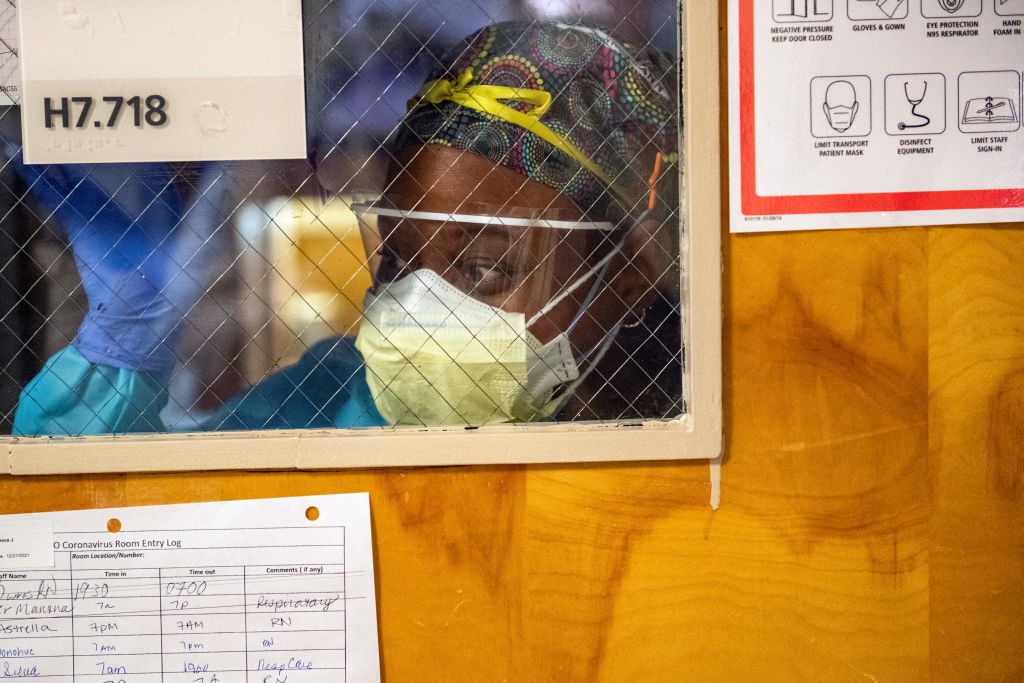Why hospitals are struggling with Omicron even as fewer people are getting seriously ill


A free daily email with the biggest news stories of the day – and the best features from TheWeek.com
You are now subscribed
Your newsletter sign-up was successful
"In hospitals around the country, doctors are taking notice: This wave of COVID seems different from the last one," The New York Times reports. Yes, hospitals are filling up again as cases surge, "but in Omicron hot spots from New York to Florida to Texas, a smaller proportion of those patients are landing in intensive care units or requiring mechanical ventilation." And there is mounting evidence that Omicron is intrinsically milder for most people, especially the vaccinated or previously infected.
"We are seeing an increase in the number of hospitalizations," Dr. Rahul Sharma, emergency physician in chief for NewYork-Presbyterian/Weill Cornell hospital, told the Times. But "we're not sending as many patients to the ICU, we're not intubating as many patients, and actually, most of our patients that are coming to the emergency department that do test positive are actually being discharged."
These "very strong signals" about Omicron's reduced severity are "unambiguously good news!" Financial Times journalist John Burn-Murdoch wrote in a chart-heavy Twitter thread. "But ... as with everything in this pandemic, once we dig deeper it gets complicated."
The Week
Escape your echo chamber. Get the facts behind the news, plus analysis from multiple perspectives.

Sign up for The Week's Free Newsletters
From our morning news briefing to a weekly Good News Newsletter, get the best of The Week delivered directly to your inbox.
From our morning news briefing to a weekly Good News Newsletter, get the best of The Week delivered directly to your inbox.
And one of the big complications is that while the Omicron variant appears to be less dangerous for individuals, it is still putting a lot of strain on hospitals. "Not every hospital is overwhelmed, but a lot of them are," Politico's Erin Banco explains. "Doctors and nurses are struggling to keep up with the work of caring for the influx of patients, not only because there are just more of them, but also because staff are calling out sick with COVID."
In both London and the U.S., "the picture is clear: While ICU is under less pressure from COVID this year, the rest of the hospital is facing more," Burn-Murdoch wrote. At the same time, "the number of ICU patients is a lagging indicator, likely to rise in the coming weeks," the Times reports. "What's more, some states are still struggling under the crush of hospitalizations from Delta."
It's "hard to condense" this wave "into a simple takeaway," Burn-Murdoch concludes. "Yes, a much lower share of cases are developing severe disease. Yes, deaths for this wave will remain well below past peaks. But no, this does not mean everything is fine."
But nobody can be sure what's next, either, the Times notes. "It has been about six weeks since the world first learned about Omicron, and hospital personnel are still waiting nervously to see how the coming weeks unfold."
A free daily email with the biggest news stories of the day – and the best features from TheWeek.com
Peter has worked as a news and culture writer and editor at The Week since the site's launch in 2008. He covers politics, world affairs, religion and cultural currents. His journalism career began as a copy editor at a financial newswire and has included editorial positions at The New York Times Magazine, Facts on File, and Oregon State University.
-
 Health insurance: Premiums soar as ACA subsidies end
Health insurance: Premiums soar as ACA subsidies endFeature 1.4 million people have dropped coverage
-
 Anthropic: AI triggers the ‘SaaSpocalypse’
Anthropic: AI triggers the ‘SaaSpocalypse’Feature A grim reaper for software services?
-
 NIH director Bhattacharya tapped as acting CDC head
NIH director Bhattacharya tapped as acting CDC headSpeed Read Jay Bhattacharya, a critic of the CDC’s Covid-19 response, will now lead the Centers for Disease Control and Prevention
-
 A Nipah virus outbreak in India has brought back Covid-era surveillance
A Nipah virus outbreak in India has brought back Covid-era surveillanceUnder the radar The disease can spread through animals and humans
-
 Trump HHS slashes advised child vaccinations
Trump HHS slashes advised child vaccinationsSpeed Read In a widely condemned move, the CDC will now recommend that children get vaccinated against 11 communicable diseases, not 17
-
 Covid-19 mRNA vaccines could help fight cancer
Covid-19 mRNA vaccines could help fight cancerUnder the radar They boost the immune system
-
 FDA OKs generic abortion pill, riling the right
FDA OKs generic abortion pill, riling the rightSpeed Read The drug in question is a generic version of mifepristone, used to carry out two-thirds of US abortions
-
 The new Stratus Covid strain – and why it’s on the rise
The new Stratus Covid strain – and why it’s on the riseThe Explainer ‘No evidence’ new variant is more dangerous or that vaccines won’t work against it, say UK health experts
-
 RFK Jr. vaccine panel advises restricting MMRV shot
RFK Jr. vaccine panel advises restricting MMRV shotSpeed Read The committee voted to restrict access to a childhood vaccine against chickenpox
-
 Texas declares end to measles outbreak
Texas declares end to measles outbreakSpeed Read The vaccine-preventable disease is still spreading in neighboring states, Mexico and Canada
-
 RFK Jr. shuts down mRNA vaccine funding at agency
RFK Jr. shuts down mRNA vaccine funding at agencySpeed Read The decision canceled or modified 22 projects, primarily for work on vaccines and therapeutics for respiratory viruses
